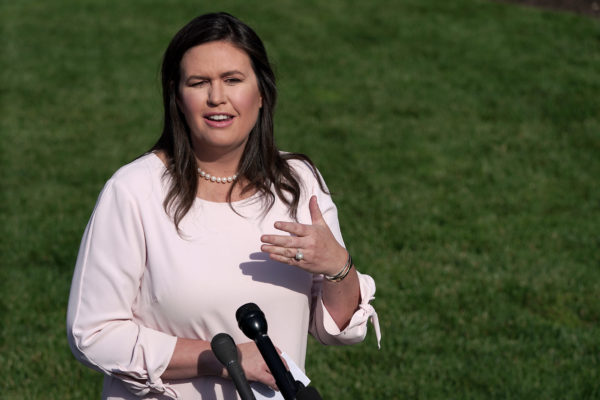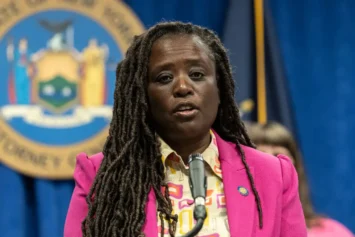Arkansas Gov. Sarah Huckabee Sanders faced criticism last week after she pardoned a Thanksgiving turkey while continuing to refuse clemency to a developmentally disabled Black man who legal advocates claim was wrongly convicted in the murder of an elderly woman three decades ago.

Charlie Vaughn and three other suspects were convicted in 1991 for the 1988 slaying of 81-year-old Fordyce resident Myrtle Holmes, but a different suspect confessed to the crime in 2015 while new evidence has since emerged that appears to support Vaughn’s claim of innocence.
In June, Stuart Chanen, Vaughn’s attorney since 2016, submitted the clemency petition to Sanders, outlining the newly uncovered information in the case, however, the governor’s office went mum on the request for a month, prompting Chanen to reach out for an update in July.
That’s when Sanders’ chief legal counsel sent an email to Chanen, saying Sanders would not be granting clemency in the case, adding that Vaughn would be eligible to reapply for commutation in 2029, six years from now.
At the time, Sanders did not provide any explanation for her decision to deny the petition, while her office since has avoided commenting on the case.
Since taking office in January, Sanders’ administration has prioritized strengthening criminal justice policies, fulfilling campaign pledges that propelled her to victory in the 2022 gubernatorial election.
In April, Sanders signed legislation that eliminated parole for certain crimes, raised the parole criteria for other offenses, and reduced the time prisoners can deduct from their sentences for good behavior. The bill also included funding for the construction of a new state prison with 3,000 beds.
More recently, at a press conference on Nov. 17, Sanders and Arkansas attorney general Tim Griffin expressed dissatisfaction with the state Board of Corrections, which rejected a proposal to add 500 more beds in existing prisons across the state.
Sanders, a staunch Republican who previously served as White House press secretary under President Donald Trump, has faced pressure in recent weeks to reconsider her stance, with some speculating that she was using the Vaughn case to boost her national profile among conservatives, while positioning herself as a potential vice presidential running mate in 2024.
State political watchers said Sanders may be hesitant to grant clemency because her father, former Arkansas Gov. Mike Huckabee, faced criticism for his own clemency decisions, including a 2009 case in which Maurice Clemmons, a prisoner granted release by Huckabee nine years earlier, murdered four police officers in Washinton state.
Despite his disability, Vaughn has always denied any involvement in the killing for which he was charged after spending a year behind bars with no professional mental health evaluation to determine his competency for trial, as required by law.
Eventually, a judge did order an evaluation for Vaughn, but the local sheriff instead sent an informant to the jail to obtain Vaughn’s purported confession, which implicated the other three men.
Shockingly, this information remained hidden from Vaughn’s defense attorney for more than two decades, prompting further calls to dismiss the case.
“My sense is that Charlie was seen as different, maybe a little off,” Chanen told the Arkansas Times. “That’s probably how he became a suspect.”
Vaughn’s confession also contradicted many established facts about the crime.
Although authorities claimed Vaughn confessed to raping Holmes with another man, DNA testing on semen collected at the scene excluded both suspects.
In addition, Vaughn’s private defense attorney, Edward Oglesby, was hired by Dallas County about a year out of college and paid him just $200 to represent Vaughn as the county lacked a full-time public defender. At the time, the judge himself expressed reservations about Vaughn’s confession, stating, “I’m sure that some governor somewhere down the road will reduce the sentence or commute it to a term of years.”
During the trial of the other suspects the following year, Vaughn testified against them, but the jury deadlocked and the judge declared a mistrial. Vaughn recanted his confession in 1991 after almost 10 months in jail, however, the other three men were later convicted during a second trial.
At the time, Oglesby also switched Vaughn’s plea from not guilty to “not guilty by reason of mental disease or defect,” leading to a 30-day mental health evaluation.
In 2015, as the Innocence Project delved into the case, Reginald Early, one of the convicted individuals previously implicated by Vaughn, confessed to the murder.
At the time, Early insisted that he acted alone and barely knew Vaughn and the other two men, and that while he contemplated confessing after his arrest he decided against it after he saw that three other suspects were arrested in connection with the crime, all of whom he knew were innocent.
Early’s confession aligned with the available evidence and matched the details known only to the police about the crime scene.
The only evidence implicating Vaughn and the other men were accounts from witnesses who told a private investigator they saw the four suspects together in the area where Holmes was killed, however, no one ever said they saw Vaughn go into the woman’s home.
Perhaps most notably, two of the men convicted based on Vaughn’s confession have been released from prison after federal courts granted relief that overturned their convictions, although one of the men since has died.
Previously, the state asserted that Vaughn should remain incarcerated, contending that he should have been aware of the developments in the other two cases. The state maintained that his failure to file a claim within a year of the discovery of new evidence demonstrated a lack of due diligence that rendered him ineligible to benefit from the recently unearthed information.
While he was incarcerated, Vaughn was again called to testify, but he didn’t have an attorney present during a post-evidentiary hearing, which he thought was a proceeding to dismiss the charges against him. In actuality, he had agreed to reverse sworn testimony he gave against his co-defendants during the first trial.
In 1995, the U.S. Court of Appeals for the Eighth Circuit denied Vaughn’s handwritten plea without explanation.
After the decision, Chanen immediately drafted a clemency petition that he submitted last year to the Arkansas Parole Board, which rejected the appeal “without merit.”
In December 2022, Chanen sought to deliver Vaughn’s petition to then-Gov. Asa Hutchison before his term ended in January. However, the state constitution requires the governor to issue a 30-day notice of intent to grant clemency, a timeline that exceeded the remaining days in Hutchison’s term. Consequently, Chanen would have to wait to submit the petition to the incoming governor instead.
Chanen said he is now preparing a habeas petition that he planned to submit to the Arkansas Supreme Court, while acknowledging the limited options available to Vaughn due to the high bar imposed by Arkansas law for cases previously denied on appeal.
“If ever anyone were deserving of this, it’s Charlie Vaughn,” Chanen said, according to the Arkansas Times.


